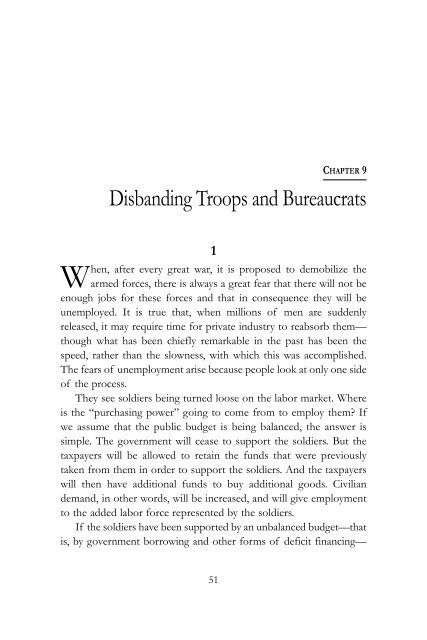- Page 2:
Economics in One Lesson
- Page 9 and 10:
viii Economics in One Lessonsubject
- Page 11 and 12:
x Economics in One LessonWhen it ca
- Page 13 and 14:
xii Economics in One Lessonnow pass
- Page 15 and 16: xiv Economics in One Lessonbe fully
- Page 18 and 19: CHAPTER 1The Lesson1Economics is ha
- Page 20 and 21: The Lesson 5policies may become evi
- Page 22: The Lesson 7are illustrated by exam
- Page 26 and 27: CHAPTER 2The Broken WindowLet us be
- Page 28 and 29: CHAPTER 3The Blessings of Destructi
- Page 30 and 31: The Blessings of Destruction 15beca
- Page 32 and 33: CHAPTER 4Public Works Mean Taxes1Th
- Page 34 and 35: Public Works Mean Taxes 19absolutel
- Page 36 and 37: Public Works Mean Taxes 21a lump su
- Page 38 and 39: CHAPTER 5Taxes Discourage Productio
- Page 40 and 41: CHAPTER 6Credit Diverts Production1
- Page 42 and 43: Credit Diverts Production 27whole c
- Page 44 and 45: Credit Diverts Production 29a chari
- Page 46 and 47: Credit Diverts Production 31The pri
- Page 48 and 49: CHAPTER 7The Curse of Machinery1Amo
- Page 50 and 51: The Curse of Machinery 35If the rea
- Page 52 and 53: The Curse of Machinery 37Mr. Edward
- Page 54 and 55: The Curse of Machinery 39long run t
- Page 56 and 57: The Curse of Machinery 41argued, fo
- Page 58: The Curse of Machinery 43Yes, we sh
- Page 61 and 62: 46 Economics in One LessonCommittee
- Page 63 and 64: 48 Economics in One Lessondo make t
- Page 65: 50 Economics in One Lessonwork coul
- Page 69 and 70: 54 Economics in One Lessonsupport n
- Page 71 and 72: 56 Economics in One Lessonconsequen
- Page 74 and 75: CHAPTER 11Who’s “Protected” b
- Page 76 and 77: Who’s “Protected” by Tariffs?
- Page 78 and 79: Who’s “Protected” by Tariffs?
- Page 80 and 81: Who’s “Protected” by Tariffs?
- Page 82 and 83: Who’s “Protected” by Tariffs?
- Page 84 and 85: CHAPTER 12The Drive for ExportsExce
- Page 86 and 87: The Drive for Exports 71would think
- Page 88: The Drive for Exports 73Bad loans a
- Page 91 and 92: 76 Economics in One Lessonlaw; and
- Page 93 and 94: 78 Economics in One Lessonfrom indu
- Page 95 and 96: 80 Economics in One Lessonimpositio
- Page 98 and 99: CHAPTER 14Saving the X Industry1The
- Page 100 and 101: Saving the X Industry 85with a sing
- Page 102: Saving the X Industry 87they are mo
- Page 105 and 106: 90 Economics in One Lessonthe effic
- Page 107 and 108: 92 Economics in One Lessonmake that
- Page 109 and 110: 94 Economics in One Lessonup mounta
- Page 112 and 113: CHAPTER 16“Stabilizing” Commodi
- Page 114 and 115: “Stabilizing” Commodities 99pro
- Page 116 and 117:
“Stabilizing” Commodities 101eq
- Page 118:
“Stabilizing” Commodities 103wh
- Page 121 and 122:
106 Economics in One Lessoncost. Le
- Page 123 and 124:
108 Economics in One Lessonrationed
- Page 125 and 126:
110 Economics in One Lessonpower, i
- Page 127 and 128:
112 Economics in One Lessonor stop
- Page 130 and 131:
CHAPTER 18Minimum Wage Laws1We have
- Page 132 and 133:
Minimum Wage Laws 117except by payi
- Page 134:
Minimum Wage Laws 119efficiency on
- Page 137 and 138:
122 Economics in One Lessonhim? And
- Page 139 and 140:
124 Economics in One Lessonprofessi
- Page 141 and 142:
126 Economics in One LessonThe unem
- Page 143 and 144:
128 Economics in One Lessonwhole co
- Page 145 and 146:
130 Economics in One Lessonbalance,
- Page 148 and 149:
CHAPTER 20“Enough to Buy Back the
- Page 150 and 151:
“Enough to Buy Back the Product
- Page 152 and 153:
“Enough to Buy Back the Product
- Page 154:
“Enough to Buy Back the Product
- Page 157 and 158:
142 Economics in One Lessonconditio
- Page 159 and 160:
144 Economics in One LessonProfits,
- Page 161 and 162:
146 Economics in One Lessonwealth.
- Page 163 and 164:
148 Economics in One Lessondemand:
- Page 165 and 166:
150 Economics in One Lessonthey wil
- Page 167 and 168:
152 Economics in One Lessonmoney ei
- Page 169 and 170:
154 Economics in One Lessonmaterial
- Page 171 and 172:
156 Economics in One Lessonmerely t
- Page 174 and 175:
CHAPTER 23The Assault on Saving1Fro
- Page 176 and 177:
The Assault on Saving 161to friends
- Page 178 and 179:
The Assault on Saving 163their buyi
- Page 180 and 181:
The Assault on Saving 165an eleven-
- Page 182 and 183:
The Assault on Saving 167this savin
- Page 184 and 185:
The Assault on Saving 169The argume
- Page 186:
The Assault on Saving 171includes m
- Page 190 and 191:
CHAPTER 24The Lesson Restated1Econo
- Page 192 and 193:
The Lesson Restated 177Now few peop
- Page 194 and 195:
The Lesson Restated 179the reformer
- Page 196 and 197:
The Lesson Restated 181oranges. Ora
- Page 198:
The Lesson Restated 183with sympath
- Page 201 and 202:
186 Economics in One Lessonparity p
- Page 203 and 204:
188 Economics in One LessonRobinson


